You are using an out of date browser. It may not display this or other websites correctly.
You should upgrade or use an alternative browser.
You should upgrade or use an alternative browser.
Iran Strikes Back
- Thread starter MASTERBAKER
- Start date
But, all did not go well.
It appears Iran mistook and shot down a Ukranian airliner taking off from Tehran enroute to Ukraine as an incoming missile or air attack.
The U.S. did something similar in 1988 when the guided missile cruiser USS Vincennes mistook Iran Air Flight 655 as an incoming missile or air attack and brought the commercial airliner down with a missile killing some 290 people. When intercept, identification and decision-making have to be made in critical seconds, a lot of bad shit can happen.
It appears Iran mistook and shot down a Ukranian airliner taking off from Tehran enroute to Ukraine as an incoming missile or air attack.
The U.S. did something similar in 1988 when the guided missile cruiser USS Vincennes mistook Iran Air Flight 655 as an incoming missile or air attack and brought the commercial airliner down with a missile killing some 290 people. When intercept, identification and decision-making have to be made in critical seconds, a lot of bad shit can happen.
Trump drone strike hits 60 innocent people as U.S kills Taliban commander we once gave money, weapons to

BY COLIN TAYLOR
PUBLISHED ON JANUARY 10, 2020
2.2k
SHARES
SHARE THIS STORY
While the world’s attention is fixated on the fallout of the Trump administration’s assassination of Iranian General Qassem Soleimani, yet another year of senseless bloodshed in Afghanistan continues with little fanfare or notice. Local officials in the Shindand district of Herat province say that an American airstrike against a Taliban splinter group commander has killed or wounded over 60 civilians, along with the target, Mullah Nangyalay.
al Jazeera reports that “‘ According to the people, over 60 civilians were killed and wounded in the operation,’ Toryalai Tahiri, deputy head of Herat provincial council, told Afghan local media TOLO News.”
Add your name to the millions demanding accountability of the president. Tell Speaker Pelosi and the House: Launch impeachment proceedings against Donald Trump!
The grimly tragic irony is that Mullah Nangialai Khan and his fighters had been part of a breakaway Taliban faction that had been provided with financial and military support by the U.S. and the Afghan government in hopes of “sowing rifts” and “nudging the insurgency towards peace talks.”
Nangalai’s group had been given cash, weapons, and ammo back in 2016 to aid them in their efforts to take control of the opium-rich Zerkoh valley from a rival Taliban faction, but like every time the United States tries to play puppetmaster with extremist groups, it didn’t work out.
The United States paid and armed a terror group to rule this valley with an iron fist, then made innocent civilians pay with their lives when he was no longer useful.
The quietly released “Afghanistan Papers” alleges that the Pentagon had no idea what they were doing in Afghanistan or why they were doing it throughout the nineteen years of endless slaughter, and it is cases like that of Mullah Nangialai that make it clear that they still haven’t figured it out.
McConnell admitted coordinating impeachment with Trump. Add your name to demand he recuse himself from the trial!
The 60 civilian casualties from Wednesday come on the heels of a gruesome September airstrike in which the U.S mistook a camp of pine nut farmers for an IS hideout, killing 30 people and wounded 40 more. The civilian casualty rate has skyrocketed in the last year, with over 8,000 innocent Afghans dead or wounded in the first ten months of 2019 alone.
But once again, the mass killing of innocent people will pass without the briefest of mention in the American media or by any politicians, yet another repulsive reminder about how normalized and desensitized we have become to the mass murder of innocent people of color by the American imperial machine.
The refusal of the mainstream media and political leadership of either party to challenge or even acknowledge the slaughter being carried out in our name is an affront to human rights and to the values that the United States is supposed to stand for. The American failure to recognize and mourn the lives of the Iraqis, Syrians, Yemenis, and Afghans killed by our bombs contributes to their dehumanization and feeds into right-wing Islamophobic tropes that paint all Muslims as terrorists who deserve their deaths.
While we rightfully fret over the prospect of yet another endless war with Iran, we must not forget about the other wars we are currently waging, or the horrifying atrocities being carried out in the name of “freedom” — and demand that our next president hold our military accountable for their crimes and their lies.
Original reporting by al-Jazeera.


BY COLIN TAYLOR
PUBLISHED ON JANUARY 10, 2020
2.2k
SHARES
SHARE THIS STORY
While the world’s attention is fixated on the fallout of the Trump administration’s assassination of Iranian General Qassem Soleimani, yet another year of senseless bloodshed in Afghanistan continues with little fanfare or notice. Local officials in the Shindand district of Herat province say that an American airstrike against a Taliban splinter group commander has killed or wounded over 60 civilians, along with the target, Mullah Nangyalay.
al Jazeera reports that “‘ According to the people, over 60 civilians were killed and wounded in the operation,’ Toryalai Tahiri, deputy head of Herat provincial council, told Afghan local media TOLO News.”
Add your name to the millions demanding accountability of the president. Tell Speaker Pelosi and the House: Launch impeachment proceedings against Donald Trump!
The grimly tragic irony is that Mullah Nangialai Khan and his fighters had been part of a breakaway Taliban faction that had been provided with financial and military support by the U.S. and the Afghan government in hopes of “sowing rifts” and “nudging the insurgency towards peace talks.”
Nangalai’s group had been given cash, weapons, and ammo back in 2016 to aid them in their efforts to take control of the opium-rich Zerkoh valley from a rival Taliban faction, but like every time the United States tries to play puppetmaster with extremist groups, it didn’t work out.
The United States paid and armed a terror group to rule this valley with an iron fist, then made innocent civilians pay with their lives when he was no longer useful.
The quietly released “Afghanistan Papers” alleges that the Pentagon had no idea what they were doing in Afghanistan or why they were doing it throughout the nineteen years of endless slaughter, and it is cases like that of Mullah Nangialai that make it clear that they still haven’t figured it out.
McConnell admitted coordinating impeachment with Trump. Add your name to demand he recuse himself from the trial!
The 60 civilian casualties from Wednesday come on the heels of a gruesome September airstrike in which the U.S mistook a camp of pine nut farmers for an IS hideout, killing 30 people and wounded 40 more. The civilian casualty rate has skyrocketed in the last year, with over 8,000 innocent Afghans dead or wounded in the first ten months of 2019 alone.
But once again, the mass killing of innocent people will pass without the briefest of mention in the American media or by any politicians, yet another repulsive reminder about how normalized and desensitized we have become to the mass murder of innocent people of color by the American imperial machine.
The refusal of the mainstream media and political leadership of either party to challenge or even acknowledge the slaughter being carried out in our name is an affront to human rights and to the values that the United States is supposed to stand for. The American failure to recognize and mourn the lives of the Iraqis, Syrians, Yemenis, and Afghans killed by our bombs contributes to their dehumanization and feeds into right-wing Islamophobic tropes that paint all Muslims as terrorists who deserve their deaths.
While we rightfully fret over the prospect of yet another endless war with Iran, we must not forget about the other wars we are currently waging, or the horrifying atrocities being carried out in the name of “freedom” — and demand that our next president hold our military accountable for their crimes and their lies.
Original reporting by al-Jazeera.

Iran admits it 'unintentionally' shot down Ukrainian plane on Wednesday in crash that killed 176 people

Iran plane crash: Tehran admits it 'unintentionally' shot down plane
Save
11 JANUARY 2020 • 3:55AM
Follow
Iranian military officials have admitted that the country "unintentionally" shot down a Ukrainian airliner, killing all 176 people on board.
State TV, reading out a military statement, blamed "human error" for shooting down the plane.
Ukraine International Airlines flight PS752 crashed six minutes after taking off from Tehran’s Imam Khomeini International Airport early on Wednesday morning.
It came hours after Iran launched a missile strike against US forces in Iraq. The crash prompted speculation that the aircraft was a casualty of crossfire.
The United States, Canada, and Britain had said on Thursday that they had intelligence which proved that the plane had been shot down, but Iran denied this and accused Dominic Raab, the British foreign secretary, of "politicising" the tragedy.
There had been accusations by foreign media and officials that Iran had tampered with the crash site.
The plane, a Boeing 737, was carrying including 82 Iranians, at least 57 Canadians and 11 Ukrainians.

Iran plane crash: Tehran admits it 'unintentionally' shot down plane
Save
11 JANUARY 2020 • 3:55AM
Follow
Iranian military officials have admitted that the country "unintentionally" shot down a Ukrainian airliner, killing all 176 people on board.
State TV, reading out a military statement, blamed "human error" for shooting down the plane.
Ukraine International Airlines flight PS752 crashed six minutes after taking off from Tehran’s Imam Khomeini International Airport early on Wednesday morning.
It came hours after Iran launched a missile strike against US forces in Iraq. The crash prompted speculation that the aircraft was a casualty of crossfire.
The United States, Canada, and Britain had said on Thursday that they had intelligence which proved that the plane had been shot down, but Iran denied this and accused Dominic Raab, the British foreign secretary, of "politicising" the tragedy.
There had been accusations by foreign media and officials that Iran had tampered with the crash site.
The plane, a Boeing 737, was carrying including 82 Iranians, at least 57 Canadians and 11 Ukrainians.
It appears Iran mistook and shot down a Ukranian airliner taking off from Tehran enroute to Ukraine as an incoming missile or air attack.
The U.S. did something similar in 1988 when the guided missile cruiser USS Vincennes mistook Iran Air Flight 655 as an incoming missile or air attack and brought the commercial airliner down with a missile killing some 290 people. When intercept, identification and decision-making have to be made in critical seconds, a lot of bad shit can happen.
Iran admits shooting down Ukrainian airliner 'unintentionally'
‘Human error’ blamed as admission comes after initial denials were contradicted by western allies’ intelligence
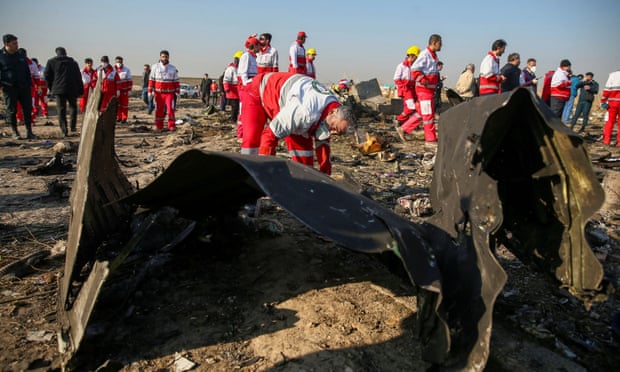
Red Crescent workers check the debris from the Ukraine International Airlines plane that crashed
after take-off from Iran’s Imam Khomeini airport Photograph: Wana News Agency/Reuters
Iran has announced that its military “unintentionally” shot down a Ukrainian jetliner, killing all 176 people onboard.
The statement came on Saturday morning via state TV with “human error” blamed for the downing of the plane. The responsible parties would be held accountable, the statement read on state TV said, with the government offering its apologies to the victims’ families including those of foreign nationals.
The Iranian foreign minister, Javad Zarif, wrote: “A sad day. Preliminary conclusions of internal investigation by armed forces: human error at time of crisis caused by US adventurism led to disaster. Our profound regrets, apologies and condolences to our people, to the families of all victims, and to other affected nations.”
A military statement carried by state media said the plane was mistaken for a hostile target after it turned toward a sensitive military centre of the Revolutionary Guard. “The military was at its highest level of readiness,” it said, amid the heightened tensions with the United States. “In such a condition, because of human error and in a unintentional way, the flight was hit.” It apologised for the disaster and said it would upgrade its systems to prevent such mistakes in the future. The responsible parties would be referred to a judicial department within the military and held accountable, the statement said.
Iran has announced that its military “unintentionally” shot down a Ukrainian jetliner, killing all 176 people onboard.
The statement came on Saturday morning via state TV with “human error” blamed for the downing of the plane. The responsible parties would be held accountable, the statement read on state TV said, with the government offering its apologies to the victims’ families including those of foreign nationals.
The Iranian foreign minister, Javad Zarif, wrote: “A sad day. Preliminary conclusions of internal investigation by armed forces: human error at time of crisis caused by US adventurism led to disaster. Our profound regrets, apologies and condolences to our people, to the families of all victims, and to other affected nations.”
A military statement carried by state media said the plane was mistaken for a hostile target after it turned toward a sensitive military centre of the Revolutionary Guard. “The military was at its highest level of readiness,” it said, amid the heightened tensions with the United States. “In such a condition, because of human error and in a unintentional way, the flight was hit.” It apologised for the disaster and said it would upgrade its systems to prevent such mistakes in the future. The responsible parties would be referred to a judicial department within the military and held accountable, the statement said.
The jetliner, a Boeing 737 operated by Ukrainian International Airlines, went down on the outskirts of Tehran during takeoff a few hours after Iran launched a barrage of missiles at US forces in Iraq.
Iran had denied for several days that a missile downed the aircraft. But then the US and Canada, citing intelligence, said they believed Iran shot it down.
The plane, en route to the Ukrainian capital of Kyiv, was carrying 167 passengers and nine crew members from several countries, including 82 Iranians, at least 63 Canadians and 11 Ukrainians.

Iran admits unintentionally shooting down Ukrainian airliner
Human error blamed after initial denials were contradicted by western allies’ intelligence
.
50 US service members diagnosed with traumatic brain injuries after Iranian missile strike
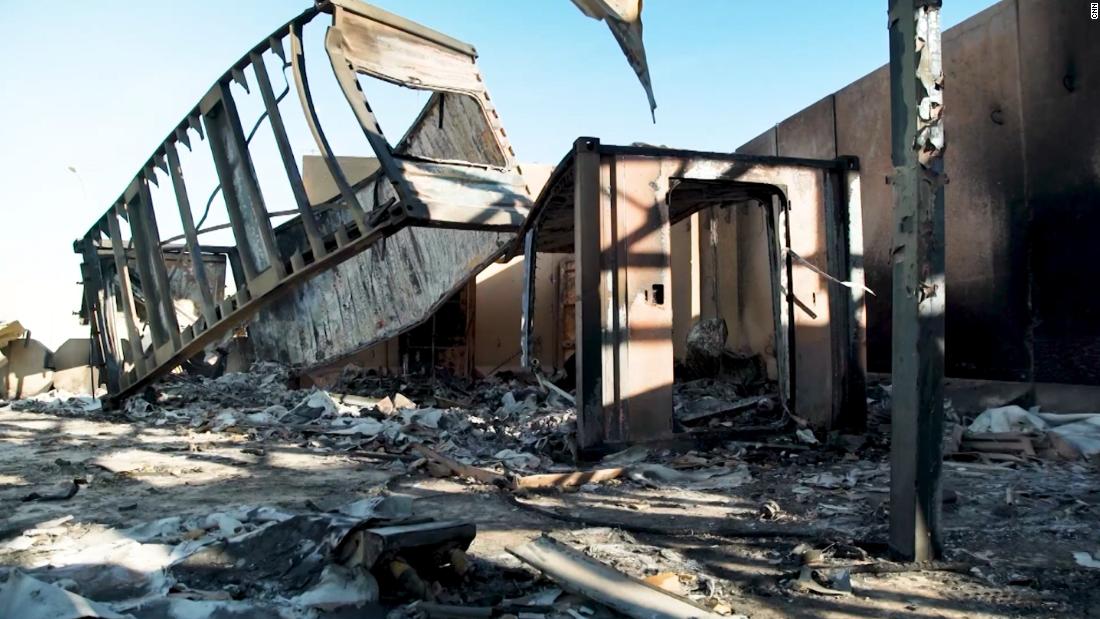
 www.cnn.com
www.cnn.com
By Barbara Starr, CNN Pentagon Correspondent
Updated 10:19 PM EST, Tue January 28, 2020

First on CNN: 50 US service members diagnosed with traumatic brain injuries after Iranian missile strike
Fifty US military personnel have now been diagnosed with concussions and traumatic brain injuries following the Iranian missile attack on US forces in Iraq earlier this month, according to a statement Tuesday from the Pentagon.
By Barbara Starr, CNN Pentagon Correspondent
Updated 10:19 PM EST, Tue January 28, 2020
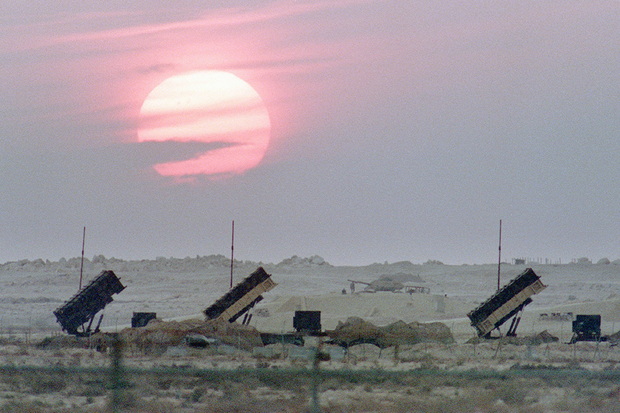
US seeks Iraqi permission to install Patriot air defences after Iran attack
Americans did not have the air defence system deployed at the Ain al-Asad base in Iraq, where Iranian missiles struck earlier this month
 www.middleeasteye.net
www.middleeasteye.net
US seeks Iraqi permission to install Patriot air defences after Iran attack
Americans did not have the air defence system deployed at the Ain al-Asad base in Iraq, where Iranian missiles struck earlier this month
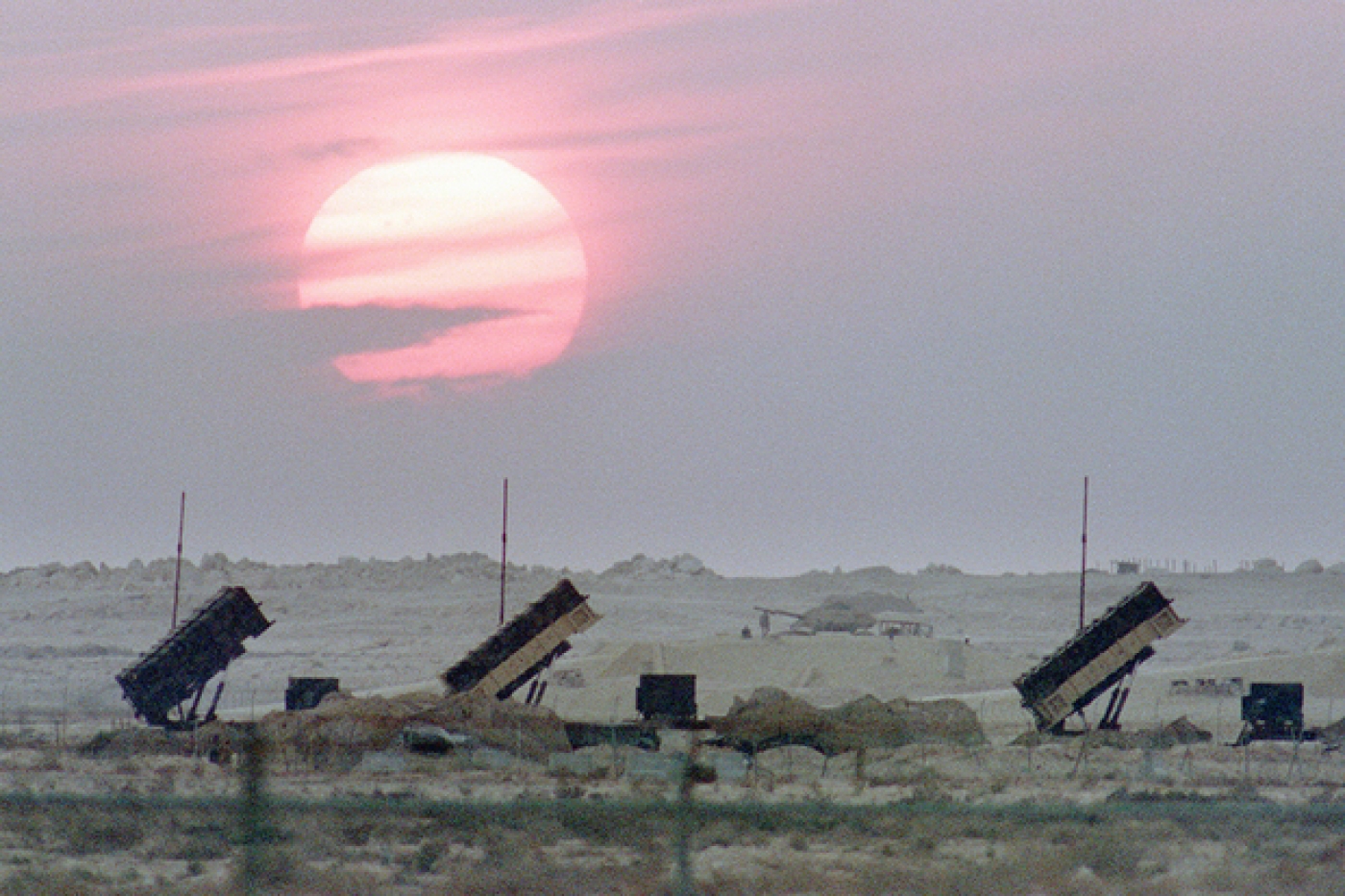
The US moved Patriot batteries to Saudi Arabia last year amid rising tensions in the region (AFP)
The United States is looking for permission from Iraq to install Patriot missile air defences inside the country to better defend US forces after Iran's 8 January attack, which wounded 64 American troops, Defence Secretary Mark Esper said.
The US did not have Patriot deployed at the Ain al-Asad air base in Iraq, where at least 11 of Iran's ballistic missiles struck, killing no one but triggering massive blasts that caused traumatic brain injuries among US forces.
"We need the permission of the Iraqis," Esper told a news conference on Thursday.
The Pentagon chief said the US military was still deciding on more tactical issues, such as where best to place the defences.
He said securing Iraq's permission was one factor slowing the repositioning of air defences.
Tehran had been expected to retaliate against the US over the killing of top Iranian general Qassem Soleimani. It was thought likely that Iran would use ballistic missiles.
But in the days prior to the Iranian strikes, the Pentagon had expected Iran to target US positions in countries other than Iraq, since Tehran counts influential allies in Baghdad.
The US had moved Patriot batteries last year to Saudi Arabia, for example.
The missile attacks capped a spiral of violence that began in late December. Both sides have refrained from further military escalation.
Trump injury comments defended
Thanks to US intelligence, the Pentagon gained hours of warning time that allowed it to move troops to bunkers that were strong enough to prevent loss of life or limb when the Iranian missiles struck, US officials say.
The bunkers were not designed to prevent the traumatic brain injuries from the huge blasts.
Esper on Thursday defended US President Donald Trump's response to the injuries, saying that the president cared about the service members.
Last week, Trump appeared to play down the injuries, saying he "heard that they had headaches and a couple of other things", prompting criticism from lawmakers and a US veterans group.
Of the 64 service members diagnosed, 39 had returned to duty, the military said.
"I've had the chance to speak with the president. He is very concerned about the health and welfare of all of our service members, particularly those who were involved in the operations in Iraq, and he understands the nature of these injuries," Esper said.
Pentagon officials said there had been no effort to minimise or delay information on concussive injuries, but its handling of the injuries following Tehran's attack has renewed questions over the US military's policy regarding how it deals with suspected brain injuries.
"[Traumatic brain injury] manifests itself over time … I still believe that morning there were no casualties reported," Esper said.
Since 2000, about 408,000 service members have been diagnosed with traumatic brain injury, according to Pentagon data.
UPDATE
Iran's missile attack reportedly left more than 100 troops with traumatic brain injury

AYMAN HENNA/AFP via Getty Images
The aftermath of Iran's January missile strike is looking more and more serious by the day.
The U.S. military will soon announce more than 100 troops suffered traumatic brain injuries after Iran attacked an Iraqi military base where they were stationed last month, a U.S. official tells Reuters. That's an increase from the 64 diagnosed troops the government originally acknowledged, and comes after Trump dismissed the injuries as "headaches."
Iran launched the Jan. 8 attack after the U.S. government assassinated Gen. Qassem Soleimani on Jan. 3. The U.S. military was reported to have advance notice of the strike, and Trump said the next day that "no Americans were harmed." Trump later repeatedly characterized any injuries sustained as "not very serious," and that he'd heard the troops had suffered only "headaches."
A Pentagon spokesperson later confirmed those headaches were actually traumatic brain injuries, and the count of those affected was upped to 64. Monday's report would add another 30-plus injured troops on top of that, per Reuters. CNN later confirmed Reuters'story via a U.S. official.
A later statement from Pentagon Press Secretary Alyssa Farah revealed that "nearly 70 percent of those diagnosed" have since been able "to return to duty." "This is a snapshot in time and numbers can change," Farah acknowledged.
Kathryn Krawczyk
Iran's missile attack reportedly left more than 100 troops with traumatic brain injury

AYMAN HENNA/AFP via Getty Images
The aftermath of Iran's January missile strike is looking more and more serious by the day.
The U.S. military will soon announce more than 100 troops suffered traumatic brain injuries after Iran attacked an Iraqi military base where they were stationed last month, a U.S. official tells Reuters. That's an increase from the 64 diagnosed troops the government originally acknowledged, and comes after Trump dismissed the injuries as "headaches."
Iran launched the Jan. 8 attack after the U.S. government assassinated Gen. Qassem Soleimani on Jan. 3. The U.S. military was reported to have advance notice of the strike, and Trump said the next day that "no Americans were harmed." Trump later repeatedly characterized any injuries sustained as "not very serious," and that he'd heard the troops had suffered only "headaches."
A Pentagon spokesperson later confirmed those headaches were actually traumatic brain injuries, and the count of those affected was upped to 64. Monday's report would add another 30-plus injured troops on top of that, per Reuters. CNN later confirmed Reuters'story via a U.S. official.
A later statement from Pentagon Press Secretary Alyssa Farah revealed that "nearly 70 percent of those diagnosed" have since been able "to return to duty." "This is a snapshot in time and numbers can change," Farah acknowledged.
Kathryn Krawczyk
US offers as much as $10m for information on Hezbollah's man in Iraq
Muhammad Kawtharani emerged as Qassem Soleimani's interim successor in overseeing Iran-backed miitias in Iraq
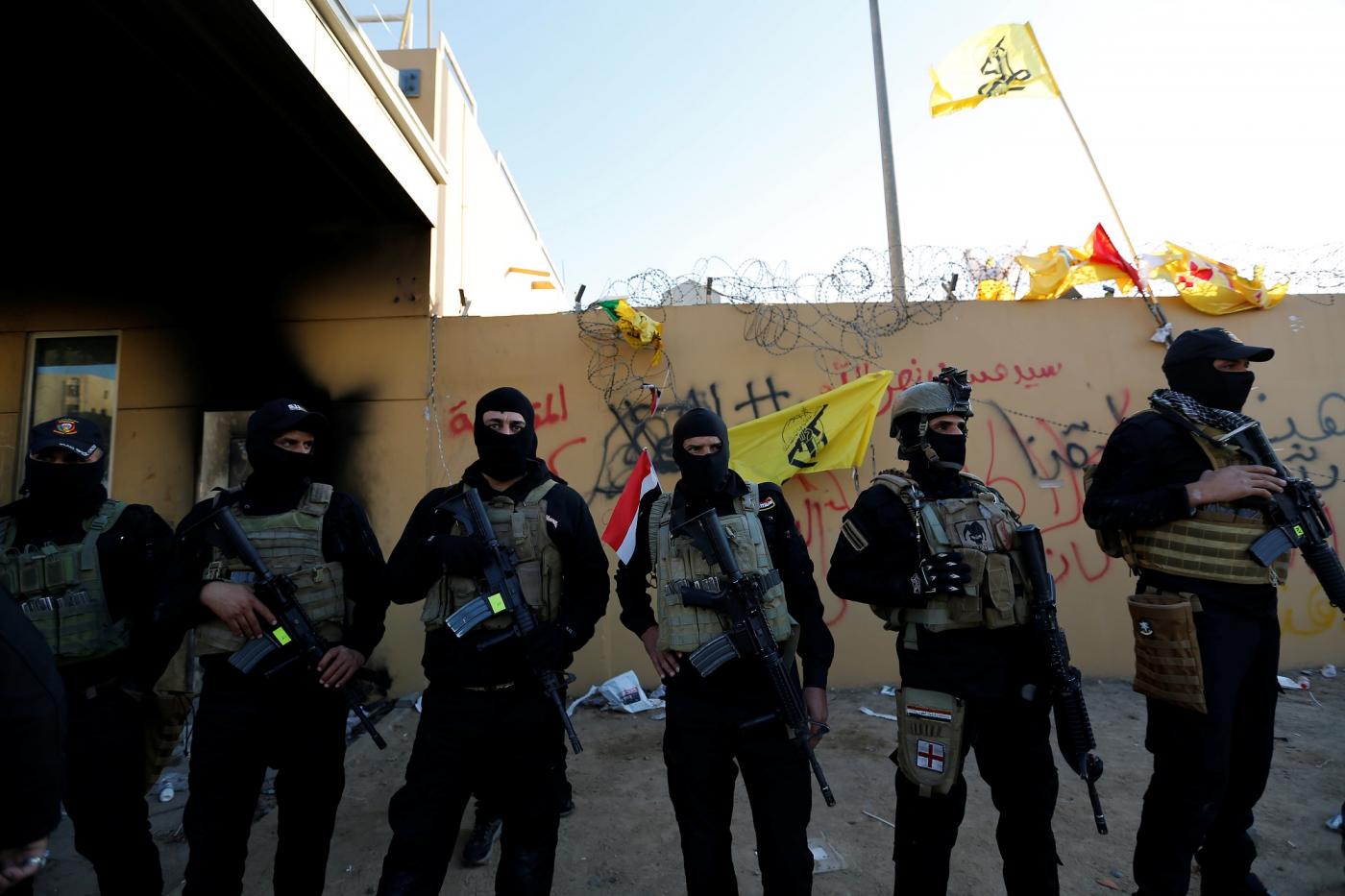
 www.middleeasteye.net
www.middleeasteye.net
The US State Department is offering as much as $10m for information on senior Hezbollah operative Muhammad Kawtharani in its latest effort to target individuals carrying out activities on behalf of Iran.
Kawtharani, who was designated as a "global terrorist" by Washington in 2013, oversees Hezbollah's activities in Iraq and is said to have assumed a greater role in the country after the death of top Iranian commander Qassem Soleimani.
"The US Department of State's Rewards for Justice program is offering a reward of up to $10 million for information on the activities, networks, and associates of Muhammad Kawtharani, a senior Hezbollah military commander," the department said in a statement on Friday.
"This announcement is part of the Department’s standing reward offer for information leading to the disruption of the financial mechanisms of the terrorist organization Lebanese Hezbollah."
Last year, Washington announced a $10m reward for information that would disrupt Hezbollah's finances.
In February, Reuters reported that Kawtharani had emerged as the interim successor of Soleimani in overseeing Tehran-backed paramilitary groups in Iraq. He even led coordination efforts between Iraqi Shia leaders for forming a new government, according to the New Arab news website.
Iraqi sources told Middle East Eye in January that Iran had tasked Hezbollah leader Hassan Nasrallah with organising and unifying Iraqi paramilitary groups after the assassination of Soleimani.
Kawtharani, a member of the Hezbollah political council, has long been in charge of the group's Iraqi affairs. In 2014, he was present at a meeting between Nasrallah and former Iraqi Vice President Nouri al-Maliki.
"Kawtharani... facilitates the actions of groups operating outside the control of the Government of Iraq that have violently suppressed protests, attacked foreign diplomatic missions, and engaged in wide-spread organized criminal activity," the State Department said on Friday.
As part of its maximum pressure campaign against Iran, Washington has been targeting Hezbollah's financial network, imposing sanctions on dozens of Lebanese and regional companies that it accuses of funding the group.
Muhammad Kawtharani emerged as Qassem Soleimani's interim successor in overseeing Iran-backed miitias in Iraq

US offers as much as $10m for information on Hezbollah's man in Iraq
Muhammad Kawtharani emerged as Qassem Soleimani's interim successor in overseeing Iran-backed miitias in Iraq
 www.middleeasteye.net
www.middleeasteye.net
The US State Department is offering as much as $10m for information on senior Hezbollah operative Muhammad Kawtharani in its latest effort to target individuals carrying out activities on behalf of Iran.
Kawtharani, who was designated as a "global terrorist" by Washington in 2013, oversees Hezbollah's activities in Iraq and is said to have assumed a greater role in the country after the death of top Iranian commander Qassem Soleimani.
"The US Department of State's Rewards for Justice program is offering a reward of up to $10 million for information on the activities, networks, and associates of Muhammad Kawtharani, a senior Hezbollah military commander," the department said in a statement on Friday.
"This announcement is part of the Department’s standing reward offer for information leading to the disruption of the financial mechanisms of the terrorist organization Lebanese Hezbollah."
Last year, Washington announced a $10m reward for information that would disrupt Hezbollah's finances.
In February, Reuters reported that Kawtharani had emerged as the interim successor of Soleimani in overseeing Tehran-backed paramilitary groups in Iraq. He even led coordination efforts between Iraqi Shia leaders for forming a new government, according to the New Arab news website.
Iraqi sources told Middle East Eye in January that Iran had tasked Hezbollah leader Hassan Nasrallah with organising and unifying Iraqi paramilitary groups after the assassination of Soleimani.
Kawtharani, a member of the Hezbollah political council, has long been in charge of the group's Iraqi affairs. In 2014, he was present at a meeting between Nasrallah and former Iraqi Vice President Nouri al-Maliki.
"Kawtharani... facilitates the actions of groups operating outside the control of the Government of Iraq that have violently suppressed protests, attacked foreign diplomatic missions, and engaged in wide-spread organized criminal activity," the State Department said on Friday.
As part of its maximum pressure campaign against Iran, Washington has been targeting Hezbollah's financial network, imposing sanctions on dozens of Lebanese and regional companies that it accuses of funding the group.
Why Iran is determined to develop its missile programme
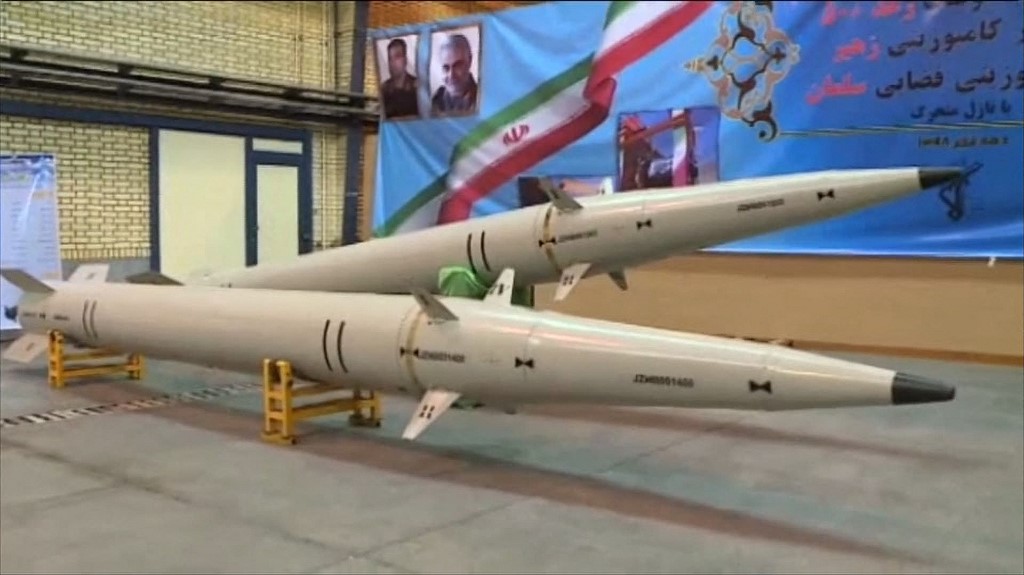
 www.middleeasteye.net
www.middleeasteye.net
Regional powers need to negotiate a new security architecture, and to acknowledge each other's legitimate concerns
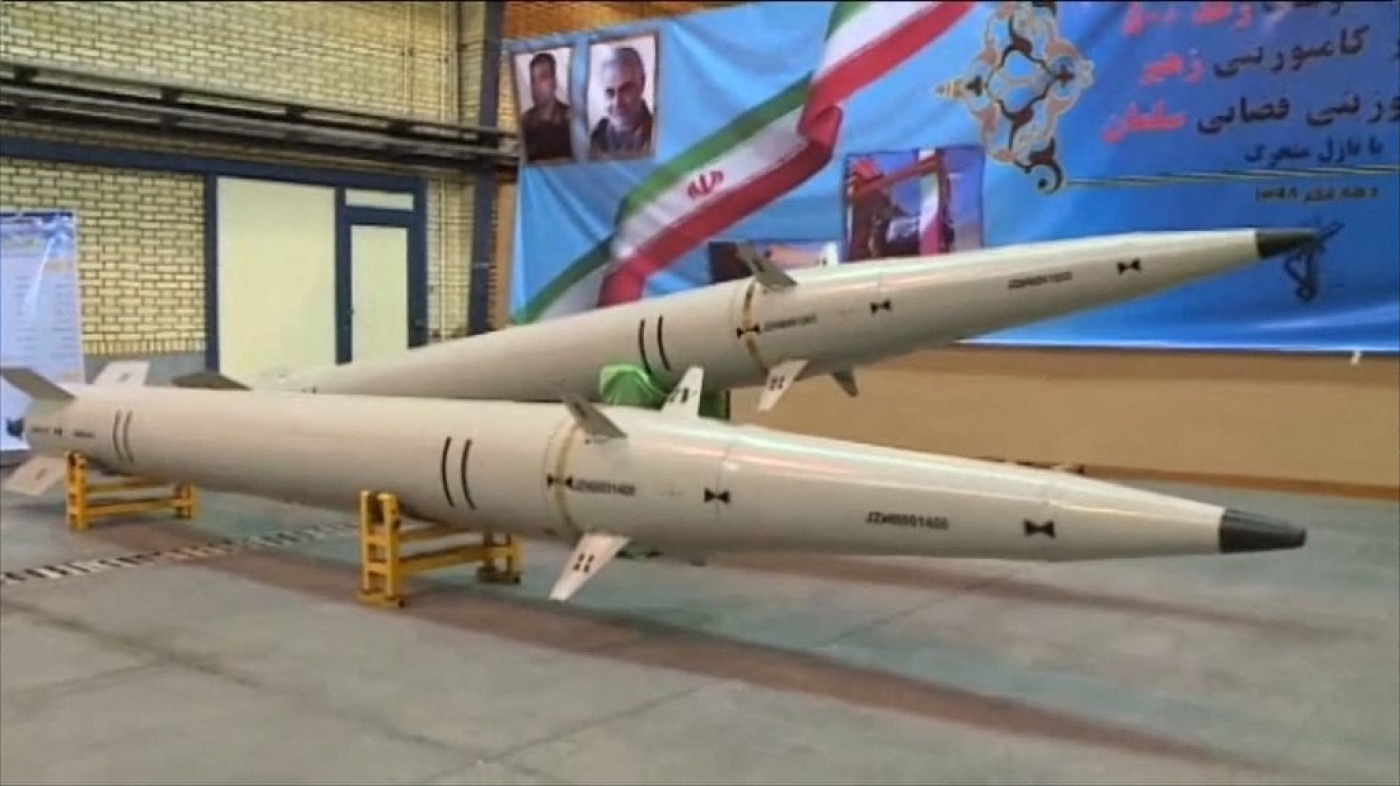
An image grab from the state-run Iran Press news agency on 9 February 2020 shows the unveiling of the Raad-500 short-range ballistic missile (Iran Press/AFP)
Since the election of Joe Biden as US president, there has been much discussion over whether and how his administration may rejoin the Iran nuclear deal. According to Secretary of State Antony Blinken, “if Iran comes back into full compliance with its obligations under the [deal], the United States would do the same thing and then we would use that as a platform to build, with our allies and partners … a longer and stronger agreement and to deal with a number of other issues that are deeply problematic in the relationship with Iran”.
Iran’s missile programme is a key concern for Washington. But Tehran has ruled out halting the programme, with President Hassan Rouhani declaring it non-negotiable. Supreme Leader Ayatollah Ali Khamenei has said that Tehran would not be “deceived” by the US offer of negotiations and would not give up its missile and space programme.
Indeed, since Biden won the November election, Iran has repeatedly underscored its determination to maintain and expand its missile capabilities. Last month, the Islamic Revolutionary Guard Corps unveiled a new underground missile base in the southern province of Hormozgan. And earlier this month, Iran’s defence minister and army chief inaugurated factories producing shoulder-fired missiles and hybrid solid fuel for missiles used in ground warfare.
The defence ministry also just launched the Zoljenah satellite carrier, capable of carrying satellites weighing up to 220 kilograms into an orbit 500 kilometres above the Earth.
Given the US insistence on curbing Iran’s missile programme and Tehran’s determination to further expand and strengthen its capabilities, it would be prudent to examine the forces driving this programme, along with the role missiles play in the Islamic Republic’s asymmetric warfare doctrine.
In recent years, Tehran’s missile arsenal has evolved to become the largest and most diverse in the Middle East, though not the most lethal or longest range. Other regional powers, such as Israel, have also developed formidable capabilities.
In addition to developing indigenous military capability, for decades Israel has been, by far, the largest recipient of US assistant and received almost unconditional military and technological support from Western powers led by the United States. In 2008 the Congress passed a law requiring that Israel maintains a "qualitative military edge over its neighbors". To further cement this policy a few months before leaving office, former President Barack Obama signed a $38bn military package aid to Israel, the largest any country has ever received.
But Iran’s programme has been deemed by the west as more controversial, attracting more political and academic attention than those of its neighbours.
Evolving capabilities
The roots of Iran’s missile programme go back to the mid-1970s, when the shah sought to make Iran a dominant regional power. Shortly before the fall of the Pahlavi regime, Israel was involved in a multibillion-dollar project to modify advanced surface-to-surface missiles for sale to Iran. The establishment of the Islamic Republic brought this cooperation to an abrupt end.
Since the 1979 revolution, Iran, unlike most of its regional adversaries, has been subject to arms embargoes. During the war with Iraq in the 1980s, Iranian troops and industrial and population centres endured heavy missile attacks by Iraqi forces. This experience gave birth to Iran’s missile programme, with Tehran initially importing weapons from countries such as China, North Korea and Russia as it gradually developed indigenous capabilities.
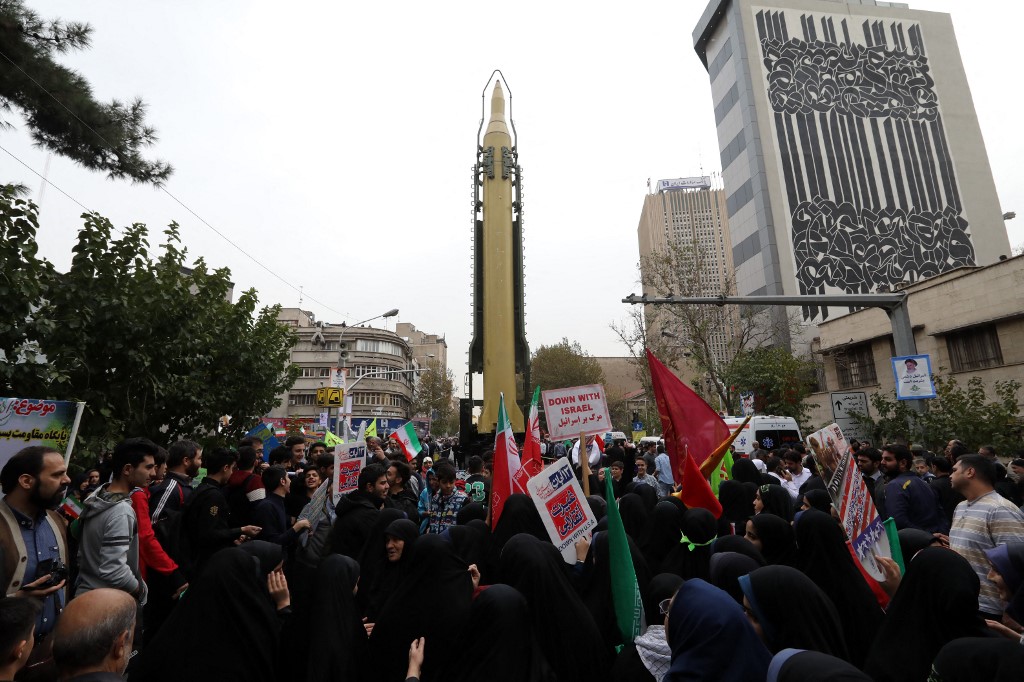
Iranians gather next to a replica of a Ghadr medium-range ballistic missile during a demonstration outside the former US embassy in Tehran in 2017
The evolution of Iran’s missile programme and the country’s growing capabilities highlight the significant role missiles play in its broader defence strategy. In recent years, a number of regional adversaries have adopted strategies to counter this perceived threat.
Israel is believed to have one of the most technologically advanced missile arsenals in the Middle East. At the same time, in collaboration with the United States, Israel has created a multi-layered missile defence apparatus that includes the Patriot, Arrow, Iron Dome and David’s Sling. Similarly, Saudi Arabia and the UAE have made deals to acquire the Terminal High Altitude Area Defence system, regarded as the US crown jewel in missile defence systems.
Resisting restrictions
During negotiations that led to the signing of the nuclear deal in 2015, Tehran successfully resisted restrictions on its missile capabilities. The notion that the heavy sanctions imposed on Iran as part of the Trump administration’s “maximum pressure” policy have weakened Iran, and should force it to make concessions, is misleading.
It’s true that the sanctions have dealt a heavy blow to the Iranian economy, particularly the oil sector - but the Islamic Republic has survived. Since late last year, Iranian oil exports have been on the rise, and the economy is projected to grow in 2021. And while Iran has been hit hard by the Covid-19 pandemic, it rolled out its mass vaccination campaign this month.
Despite the ongoing economic challenges, the Iranian government seems to face little, if any, widespread organised opposition, with the last large-scale demonstrations taking place in late 2019. Of course, this does not mean everything is fine in Iran; the country faces many problems, but the maximum pressure policy did not force it to capitulate.
The US, European powers and regional allies need to acknowledge Iran’s security concerns. Tehran’s determination to acquire and develop missile capabilities, and its willingness to pay a high price to achieve this, must be examined.
Regional security landscape
The huge disparity in defence expenditures between Iran and its neighbours suggests that the broad regional military balance needs to be negotiated.
Iran’s regional adversaries possess the most advanced American and European weaponry. Its own missile programme cannot be separated from the regional arms race, and can only be adequately addressed within a broader discussion of the regional security landscape.
Last month, Qatar’s foreign minister called on Gulf Arab countries to enter a dialogue with Iran. It is time for regional powers to negotiate a new security architecture, and to acknowledge each other’s legitimate concerns.

Why Iran is determined to develop its missile programme
Regional powers need to negotiate a new security architecture, and to acknowledge each other's legitimate concerns
 www.middleeasteye.net
www.middleeasteye.net
Regional powers need to negotiate a new security architecture, and to acknowledge each other's legitimate concerns

An image grab from the state-run Iran Press news agency on 9 February 2020 shows the unveiling of the Raad-500 short-range ballistic missile (Iran Press/AFP)
Since the election of Joe Biden as US president, there has been much discussion over whether and how his administration may rejoin the Iran nuclear deal. According to Secretary of State Antony Blinken, “if Iran comes back into full compliance with its obligations under the [deal], the United States would do the same thing and then we would use that as a platform to build, with our allies and partners … a longer and stronger agreement and to deal with a number of other issues that are deeply problematic in the relationship with Iran”.
Iran’s missile programme is a key concern for Washington. But Tehran has ruled out halting the programme, with President Hassan Rouhani declaring it non-negotiable. Supreme Leader Ayatollah Ali Khamenei has said that Tehran would not be “deceived” by the US offer of negotiations and would not give up its missile and space programme.
Indeed, since Biden won the November election, Iran has repeatedly underscored its determination to maintain and expand its missile capabilities. Last month, the Islamic Revolutionary Guard Corps unveiled a new underground missile base in the southern province of Hormozgan. And earlier this month, Iran’s defence minister and army chief inaugurated factories producing shoulder-fired missiles and hybrid solid fuel for missiles used in ground warfare.
The defence ministry also just launched the Zoljenah satellite carrier, capable of carrying satellites weighing up to 220 kilograms into an orbit 500 kilometres above the Earth.
Given the US insistence on curbing Iran’s missile programme and Tehran’s determination to further expand and strengthen its capabilities, it would be prudent to examine the forces driving this programme, along with the role missiles play in the Islamic Republic’s asymmetric warfare doctrine.
In recent years, Tehran’s missile arsenal has evolved to become the largest and most diverse in the Middle East, though not the most lethal or longest range. Other regional powers, such as Israel, have also developed formidable capabilities.
In addition to developing indigenous military capability, for decades Israel has been, by far, the largest recipient of US assistant and received almost unconditional military and technological support from Western powers led by the United States. In 2008 the Congress passed a law requiring that Israel maintains a "qualitative military edge over its neighbors". To further cement this policy a few months before leaving office, former President Barack Obama signed a $38bn military package aid to Israel, the largest any country has ever received.
But Iran’s programme has been deemed by the west as more controversial, attracting more political and academic attention than those of its neighbours.
Evolving capabilities
The roots of Iran’s missile programme go back to the mid-1970s, when the shah sought to make Iran a dominant regional power. Shortly before the fall of the Pahlavi regime, Israel was involved in a multibillion-dollar project to modify advanced surface-to-surface missiles for sale to Iran. The establishment of the Islamic Republic brought this cooperation to an abrupt end.
Since the 1979 revolution, Iran, unlike most of its regional adversaries, has been subject to arms embargoes. During the war with Iraq in the 1980s, Iranian troops and industrial and population centres endured heavy missile attacks by Iraqi forces. This experience gave birth to Iran’s missile programme, with Tehran initially importing weapons from countries such as China, North Korea and Russia as it gradually developed indigenous capabilities.

Iranians gather next to a replica of a Ghadr medium-range ballistic missile during a demonstration outside the former US embassy in Tehran in 2017
The evolution of Iran’s missile programme and the country’s growing capabilities highlight the significant role missiles play in its broader defence strategy. In recent years, a number of regional adversaries have adopted strategies to counter this perceived threat.
Israel is believed to have one of the most technologically advanced missile arsenals in the Middle East. At the same time, in collaboration with the United States, Israel has created a multi-layered missile defence apparatus that includes the Patriot, Arrow, Iron Dome and David’s Sling. Similarly, Saudi Arabia and the UAE have made deals to acquire the Terminal High Altitude Area Defence system, regarded as the US crown jewel in missile defence systems.
Resisting restrictions
During negotiations that led to the signing of the nuclear deal in 2015, Tehran successfully resisted restrictions on its missile capabilities. The notion that the heavy sanctions imposed on Iran as part of the Trump administration’s “maximum pressure” policy have weakened Iran, and should force it to make concessions, is misleading.
It’s true that the sanctions have dealt a heavy blow to the Iranian economy, particularly the oil sector - but the Islamic Republic has survived. Since late last year, Iranian oil exports have been on the rise, and the economy is projected to grow in 2021. And while Iran has been hit hard by the Covid-19 pandemic, it rolled out its mass vaccination campaign this month.
Despite the ongoing economic challenges, the Iranian government seems to face little, if any, widespread organised opposition, with the last large-scale demonstrations taking place in late 2019. Of course, this does not mean everything is fine in Iran; the country faces many problems, but the maximum pressure policy did not force it to capitulate.
The US, European powers and regional allies need to acknowledge Iran’s security concerns. Tehran’s determination to acquire and develop missile capabilities, and its willingness to pay a high price to achieve this, must be examined.
Regional security landscape
The huge disparity in defence expenditures between Iran and its neighbours suggests that the broad regional military balance needs to be negotiated.
Iran’s regional adversaries possess the most advanced American and European weaponry. Its own missile programme cannot be separated from the regional arms race, and can only be adequately addressed within a broader discussion of the regional security landscape.
Last month, Qatar’s foreign minister called on Gulf Arab countries to enter a dialogue with Iran. It is time for regional powers to negotiate a new security architecture, and to acknowledge each other’s legitimate concerns.
Iran was on the click's hit list. They just got to do more hollywood after invading Afghanistan, Panama, Iraq, Libya, etc. because of lies.
US says Iran talks will continue despite upheaval in Israel and Palestine
US Secretary of State Antony Blinken appears to dismiss Republican calls for halting negotiations over Iran's alleged support for Hamas
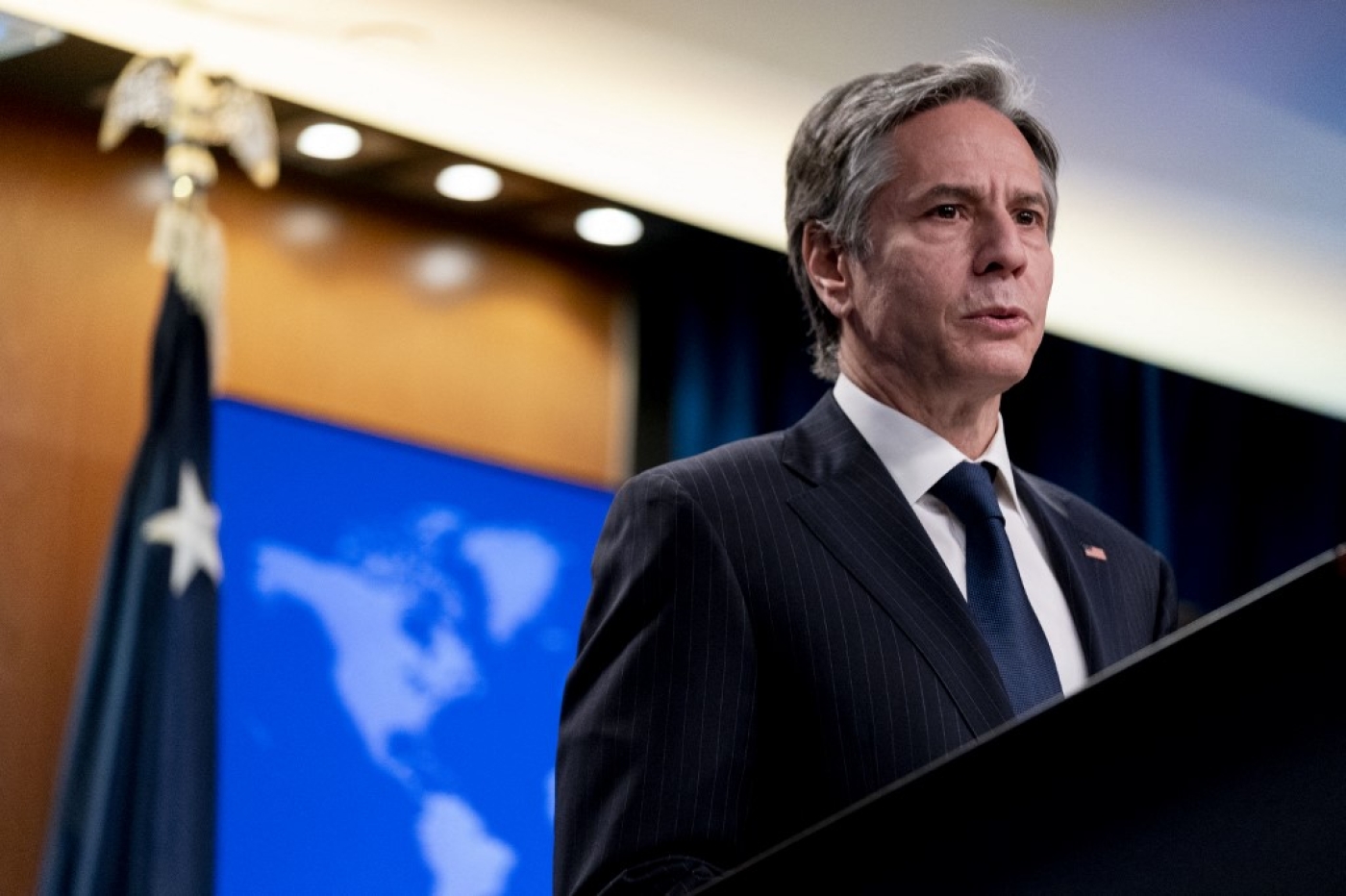
US Secretary of State Antony Blinken has reaffirmed the Biden administration's plans to move forward with nuclear negotiations with Iran, despite Republican calls to scrap the talks over Tehran's alleged support of the Gaza-based Hamas movement.
A group of 43 Republican Senators sent a letter to Blinken on Wednesday, asking the secretary of state to call off the multilateral nuclear talks in Vienna over Tehran's alleged involvement with Hamas, which governs the Israel-blockaded Gaza Strip.
Hamas began firing crudely made rockets into Israeli territory earlier this week in response to Israel's attacks on al-Aqsa Mosque worshippers and its crackdown on protests in occupied East Jerusalem. While Israel's Iron Dome missile defence system has intercepted the vast majority of the rockets, Israel has responded with air strikes that have killed more than 100 people in the coastal enclave, including 27 children and 11 women.
Blinken, during a joint press conference with his Australian counterpart on Thursday, said he could not confirm that Iran had any involvement in Hamas' most recent actions. But he said that if Tehran did have a hand in supporting the movement then that would only further highlight the importance of the negotiations.
"I don't have anything to offer on whether there is Iranian involvement or not in what's taking place [in Israel]. But I would only say that when it comes to any of the malign activities that Iran may or may not be engaged in - whether it is support for terrorism, whether its efforts to destabilise other countries, whether it is other actions that we find objectionable - that only underscores the importance of doing everything we can to make sure that Iran never requires a nuclear weapon," Blinken said.
"An Iran with a nuclear weapon or with the capacity to have one in a very short order is an Iran likely to act with even greater impunity when it comes to these other other actions. So, the talks go on in Vienna in an effort to see if we can return to mutual compliance with the JCPOA," he said using an acronym for the Obama-era nuclear deal.
The group of Republicans, however, have insisted - without providing evidence - that Hamas is funded by Iran, saying it was "troubling" that the Biden administration would be negotiating with "the world’s leading state sponsor of terrorism" - a label touted by the Trump administration, which withdrew the US from the original nuclear deal.
"The United States must not do anything to enrich Israel's enemies, such as by offering sanctions relief to a regime that seeks to destroy Israel," the senators said. "As a longtime friend of the Jewish state, we also urge you to unequivocally support Israel's right to defend itself against any and all terrorist attacks."
Biden stands firm with Israel
The Biden administration has taken a hard line against Hamas, portraying the movement as the main aggressors during this recent bout of upheaval.
Earlier on Thursday, President Joe Biden defended Israel's deadly air campaign, which he said did not represent "a significant over-reaction" on the part of Israel, despite the vast discrepancy in death tolls and damage.
White House Press Secretary Jen Psaki later stressed that Hamas rockets could not be considered self-defence, and reiterated the administration's attempts to get regional partners to influence Hamas to de-escalate tensions.
Meanwhile, most governments in the Middle East have spoken out in support of the Palestinian cause in recent days, and officials from the United Arab Emirates, Bahrain, Sudan and Morocco - all of which normalised ties with Israel in 2020 - have all criticised Israeli policies this week.
Meanwhile, Iran’s Supreme Leader Ayatollah Ali Khamenei has urged all nations to condemn Israel’s "brutal and cruel crime" against Palestinians.
"[Palestinians] should make themselves powerful, resist and confront so as to force the other party to withdraw from crime and surrender to what’s right and fair," Iranian state TV quoted Khamenei as saying on Tuesday.
"You cannot speak to these criminals [Israel] except in the language of power," he said.
Similar threads
- Replies
- 8
- Views
- 268
- Replies
- 16
- Views
- 366
- Replies
- 5
- Views
- 100
- Replies
- 12
- Views
- 266

